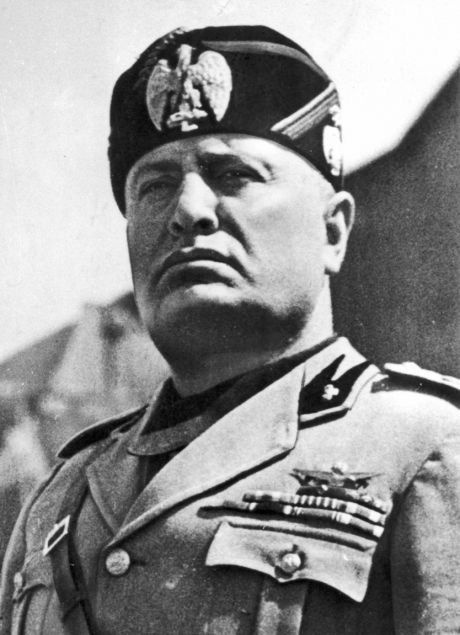July 29th, 1883 – April 28th, 1945
Benito Amilcare Andrea Mussolini was born in Predappio Italy, his father was a blacksmith and a socialist journalist, and his mother was a primary school teacher. Mussolini received a formidable education and was able to graduate with a teaching diploma. He read the philosophical works of political thinkers such as Fredrich Nietzsche and Karl Marx1, where he most likely formed his own political opinions. Mussolini was able to become politically active at a young age, where he would call for strikes and violence against the ruling elites1. In March 1919, Mussolini was able to form the Fascist Party of Italy, they were able to gain much support from unemployed war veterans. Benito Mussolini was able to form these veterans into armed squads known as the black shirts, who were notorious for terrorizing their political opponents2. Mussolini was able to successfully work his way up to the position of Prime Minister, which was offered by King Emmanuel III in 19221. He slowly dismantled the democratic systems within Italy, until eventually he had created his own dictatorship with himself the sole individual in power1. By the time he was 42, he was already the fascist dictator of Italy, his rule even being praised by western leaders of the time such as Winston Churchill, who believed that a return to order was needed1. Mussolini grew increasingly ambitious, and hungered for even more power. In 1935, he launched a campaign against Ethiopia to further Italy’s colonial holdings, they were successful in their invasion, but Mussolini’s aggressive actions caused him to be denounced by much of the western world. Due to Italy’s reputation after the invasion of Ethiopia, Mussolini then decided to side with Hitler during World War II. Not long after, in 1945 Mussolini was abandoned with just a handful of men, which lead to his capture and subsequent execution. The early 20th century was a trying time for Italy, they were also a country that got hit heavily by the great depression, so there were many citizens who were looking for answers, and were upset with their government because they felt like they had failed them2. This anger and discontent created the perfect climate for Benito Mussolini to rise. He was a strong, charismatic figure who was able to rally others into violent opposition of the Italian government. What Mussolini was able to do In Italy became a common trend across Europe, soon Germany followed with Adolf Hitler, along with Spain, who turned to a fascist leader Francisco Franco. The impact that Mussolini had can still be felt to this day, not only did he pave the way for fascist dictators like Hitler and Franco to rise, but his extreme nationalism and aggressive foreign policy contributed to World War II, one of the most destructive and bloodiest world conflicts in the world’s history1. Mussolini’s influence has reached beyond his own years however, as every July 29th, due to said date being Mussolini’s birthday, thousands of tourists from around the world, typically those who are involved in far right-wing circles, travel to Predappio to celebrate the life of Mussolini4. It is a major source of income for the city of Predappio, many shops sell souvenirs, along with t-shirts that portray Mussolini’s likeness on t-shirts4. Though the consensus is that Mussolini is dead, and along with him died fascism, it is clear to see that his influence still reaches people nearly 80 years later, as many flock to his birthplace to celebrate him, and to praise what he did throughout his life4.
Spencer Sullivan
Bibliography
Lorenzini, Pietro. “Benito Mussolini.” Salem Press Biographical Encyclopedia, January 2017.
“History – Historic Figures: Benito Mussolini (1883-1945).” BBC. Accessed November 08, 2017. http://www.bbc.co.uk/history/historic_figures/mussolini_benito.shtml.
Richardson, Charles O. “The Rome Accords of January 1935 and the Coming of the Italian-Ethiopian War.” The Historian 41, no. 1 (1978): 41-58. doi:10.1111/j.1540-6563.1978.tb01227.x.
Paradiso, Max. “The Polite Cult of Mussolini.” New Statesman 146, no. 5382, 13-14.
Gilbert, Martin. “The Rise of Fascism in Europe in the twentieth century: lessons for today .” India International Centre Quarterly 29, no. 2 (2002): 31-38.
Other Relevant Reading
Bruckner, Tim A., Andrew Noymer, and Ralph A. Catalano. “Life Expectancy during the Great Depression in Eleven European Countries.” Population and Development Review 39, no. 1 (2013): 57-74. doi:10.1111/j.1728-4457.2013.00573.x.
Nelis, Jan. “Constructing Fascist Identity: Benito Mussolini and the Myth of Romanità.” Classical World 100, no. 4 (2007): 391-415. doi:10.1353/clw.2007.0069.
